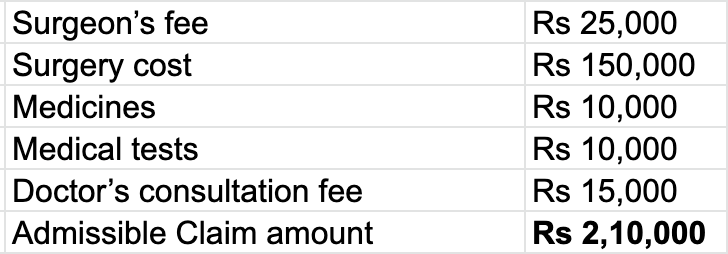I recently bought health insurance for few family members. The kind of person I'm, this meant an uncontrollable spiral into research
I read through at-least
- 15 policy documents,
- handbooks+circulars published by IRDAI (the regulatory authority),
- and several blogs
**10 things to remember while buying health insurance**
Now the fun part
The room rent across major Insurers is generally capped to 1% of Sum Insured(SI) per day; which means if your SI is 5 lakh, the insurer WON'T pay more than 5k/day
ICU room charges are generally capped to 2% of SI; which means if your SI is 5 lakh, the insurer will NOT pay more than 10k/day
If you have had experience with ICU charges, 10k/day is nothing for ICU
Say you have a SI of 5 lakh, and you had opted for a room within admissible range (5k/day)
Imagine on the day of discharge, you are presented with the final bill as shown

Each of the line items gets reduced in "proportion" of (5/8) = (admissible/actual room rent)

Tragic and funny
You need to be very careful about Co-pay especially if you are buying Insurance for Senior citizens, or folks with critical illness
What that means is, if your admissible claim amount is say 3 lakh, for a Co-pay of 10%, you will have to put up 30k; if claim amount is 5 lakh, you will have to put up 50k. You get the idea
Unfortunate as it is, when she buys an insurance, she CAN'T claim any costs towards hospitalisations@Diabetes till she has waited for at-least
Also, the waiting period differs across diseases & Insurers
**What I did - I looked for a policy that gave me 2 years as waiting period; most insurers give a standard 4 year waiting period
**Make a list of all the pre-existing diseases(PED)/critical diseases specific to the person being insured and factor in the waiting period for those specific diseases
This means, the day I exit my org, the policy expires. Worst, the reverse countdown that had started on my waiting period gets reset!
Fortunately, there's an easy way to tackle this
**Porting - Moving to a new Insurer
Migration - Moving to a new policy within the same Insurer
So say for a family of 3 (1 kid, husband and wife), the total SI could be 5 lakh, which can be claimed by any of the 3 members
On demise of the primary policyholder, the policy ceases to exist for all other members, and they have to buy a new policy at the existing market rates
Many Insurers reward you a 5% CB for every claim free year though I did see policies going as high as 25%
% of CB is important if you are buying insurance early on and also if you are fit. Why?
Say you have an individual insurance with cover of 5 lakh. If you get hospitalised for a medical emergency, and your total expense was 8 lakh, you will have to pay...
Now say everything remains the same, in addition, you also had a top-up policy with a deductible of 5 lakh.
This time, the remaining 3 lakh (claim amount above deductible) will be covered by your top-up policy
ALWAYS go for policies that have "cashless" mode & ALWAYS check for hospitals around you that are included in the PPN.
You May Also Like
1/Politics thread time.
To me, the most important aspect of the 2018 midterms wasn't even about partisan control, but about democracy and voting rights. That's the real battle.
2/The good news: It's now an issue that everyone's talking about, and that everyone cares about.
3/More good news: Florida's proposition to give felons voting rights won. But it didn't just win - it won with substantial support from Republican voters.
That suggests there is still SOME grassroots support for democracy that transcends
4/Yet more good news: Michigan made it easier to vote. Again, by plebiscite, showing broad support for voting rights as an
5/OK, now the bad news.
We seem to have accepted electoral dysfunction in Florida as a permanent thing. The 2000 election has never really
To me, the most important aspect of the 2018 midterms wasn't even about partisan control, but about democracy and voting rights. That's the real battle.
2/The good news: It's now an issue that everyone's talking about, and that everyone cares about.
3/More good news: Florida's proposition to give felons voting rights won. But it didn't just win - it won with substantial support from Republican voters.
That suggests there is still SOME grassroots support for democracy that transcends
4/Yet more good news: Michigan made it easier to vote. Again, by plebiscite, showing broad support for voting rights as an
5/OK, now the bad news.
We seem to have accepted electoral dysfunction in Florida as a permanent thing. The 2000 election has never really
Bad ballot design led to a lot of undervotes for Bill Nelson in Broward Co., possibly even enough to cost him his Senate seat. They do appear to be real undervotes, though, instead of tabulation errors. He doesn't really seem to have a path to victory. https://t.co/utUhY2KTaR
— Nate Silver (@NateSilver538) November 16, 2018












